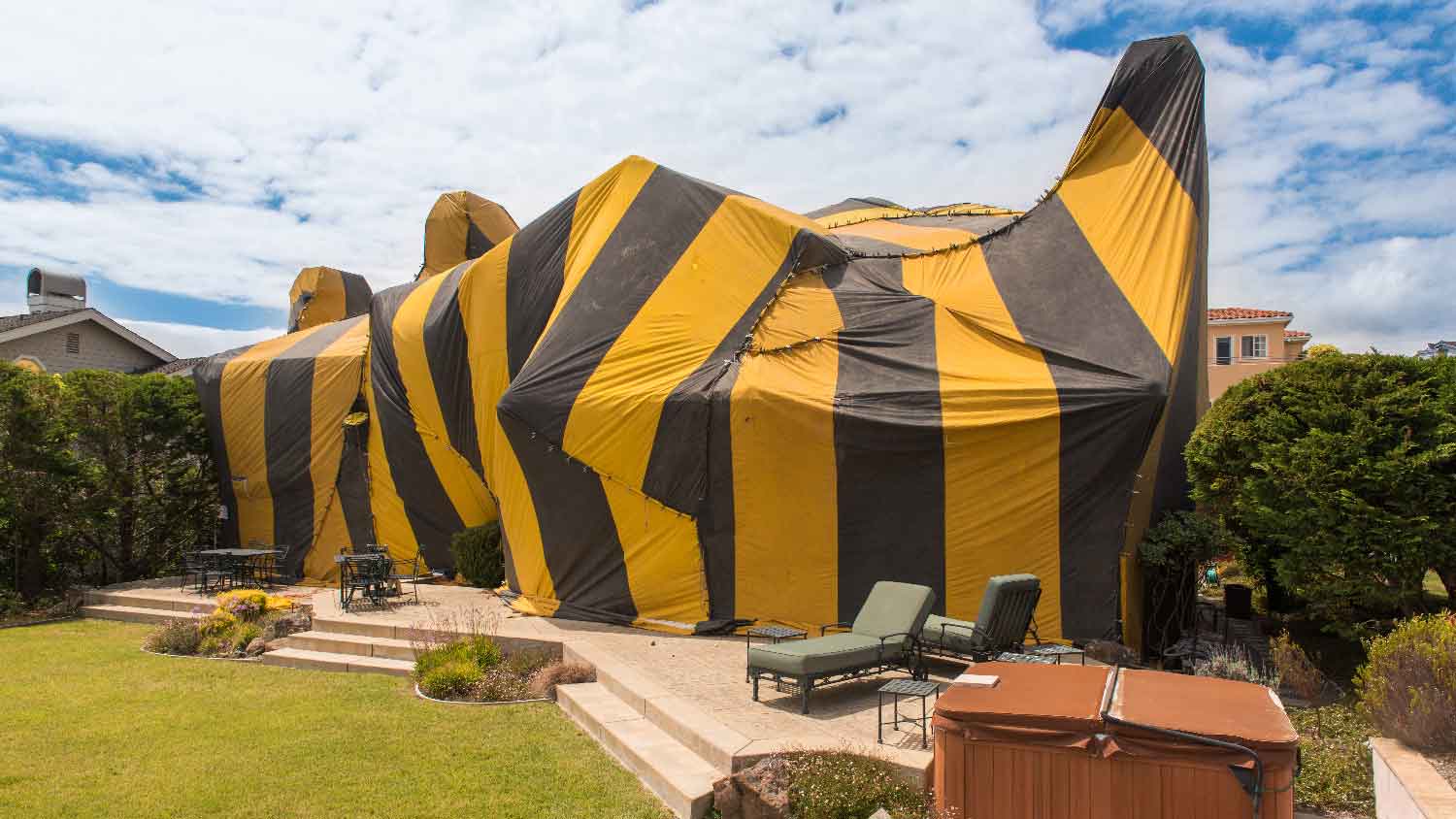
When calculating the cost of hiring a flea exterminator, consider your home size and the infestation extent. This guide will help you figure out what to budget.
Discover the best way to get rid of cockroaches using natural goods


Hire a cockroach control pro to identify which repellent makes sense for your house based on the infestation severity and whether you have children or pets.
Natural oils—including tea tree, eucalyptus, lavender, cypress, peppermint, and citronella—might deter roaches from entering your home.
Common household items such as baking soda and soap can also ward off cockroaches.
When you find roaches in your home, you may be tempted to do everything to make sure they don’t darken your doorway again. Luckily, there are natural roach repellents that can help before turning to traditional pest control methods.
Before we get into the spray-free removal methods, even with these gentler methods, it’s important to keep them out of the reach of pets and kids. You should also not use these methods in the event of an infestation and should rather use them as prevention. If you have a roach infestation, you will need to call in a professional exterminator to eradicate them.
If you spot two or more roaches in your home, it's time to call in a professional exterminator. Don't hesitate to take pest control action to prevent the infestation from growing.

You may think of essential oils as calming scents that people often diffuse as alternatives to candles or plug-ins. And while that is usually the case, these natural ingredients can also be used to deter roaches from making your house their home.
Combine one part vinegar, four parts water, and a few drops of tea tree oil to make a solution that you can spray wherever roaches roam.
Eucalyptus oil can be diluted with water in a spray bottle and applied throughout the inside or outside of your home to keep bugs away.
Spraying lavender oil or putting drops in small dishes around the house can not only add a calming effect to your home, but also drive insects like roaches away.
Strong odor from diluted cypress oil can be off-putting to roaches, so you can try mixing a few drops of cypress oil with water in a spray bottle or diffusing the oil.
Peppermint is another scent that roaches find unwelcoming, so diffusing peppermint oil or creating a concoction with water and spraying it around your home can help keep the bugs at bay.
It’s a known mosquito repellent, but citronella can also be used to discourage bugs like roaches from coming near your home.
Indoor plants such as rosemary, catnip, and mint can act as natural roach repellents without the danger of toxic chemicals or the headache of messy traps or sprays. Let’s dive into how each one works as a natural roach repellent:
Rosemary is considered one of the best roach repellents because it’s actually highly toxic to the insects. Even better, this plant can be found at your local nursery, hardware store, or plant shop and requires little water.
Just make sure you place it in direct sunlight. If you don’t enjoy the fragrant smell of rosemary, you can try leaving a few sprigs in places where you’ve spotted roaches.
Catnip is another indoor plant that requires little upkeep but produces lasting results when it comes to repelling roaches. Its leaves contain nepetalactone, a chemical that can be as effective as Deet in warding off bugs like mosquitoes or roaches. If you’re a cat lover, you can also use catnip in oil form to ensure your cat doesn’t eat the plant since too much catnip can upset your their stomachs. If you have cats or dogs, research the plant first to ensure you never bring toxic plants into your home.
Mint is another common plant that repels roaches with its strong scent. For best results, you can plant mint both inside and outside, and it will keep other bugs like beetles and fleas at bay, too.
Roaches love food, but just like a picky toddler, there are some things they hate so much they just might stop frequenting your kitchen altogether. There are many anti-roach food recommendations out there, but not all of them work well—and some could make your problem even worse. For example, some people recommend using cucumber water to drive away cockroaches, but the smell of cucumber is more likely to attract curious bugs. Try these foods instead:
Oranges, lemons, limes, and grapefruits all give off strong citrus scents that roaches hate, which is why it’s helpful to look for cleaning products that are citrus scented.
This common grocery store ingredient gives off a strong odor that roaches don’t like, which is why placing leaves in small bowls where you want to keep roaches away can work in your favor.
What’s more fragrant than garlic? Although you won’t want to spread garlic around your home, you can try to sprinkle garlic powder inside your kitchen cabinets or in other discrete areas where roaches are unwelcome. The scent alone is helpful in keeping the bugs away.
Although it’s not considered as effective as some other foods, you can still place cinnamon sticks with other household herbs to keep bugs away.
Often used in Southeast Asian cooking, pandan leaves give off a strong fragrance that could also repel roaches, although they won’t be effective if you have a more persistent issue or an infestation.
To keep cockroaches out of specific areas, you can also spread fresh coffee grounds in easy-to-access areas or places where you’ve spotted pesky insects.
Don’t just leave these foods on your counters, which can attract roaches to your home. Instead, try making sachets out of muslin or cheesecloth. Fill them with bay leaves, garlic, and catnip and hang them in your food cabinets and pantry.
While the aromas of these foods can drive roaches away before they ever get to your home, it likely won’t get rid of a large, existing roach problem.

Try using these household items to ward off a future roach infestation.
Baking soda is another popular way to kill roaches fast without breaking out those big chemicals. The way baking soda works on roaches is kind of macabre: simply leave a dish of baking soda out in an area where you have spotted multiple roaches. The roaches will eat the baking soda, ultimately leading to their demise.
This option has been popular for decades because it’s so effective and environmentally friendly. Diatomaceous earth is teeny tiny phytoplankton reduced to little more than silica and grit. Sprinkle this stuff generously wherever you have seen roaches in your home and let it get to work.
The grit that makes up this stuff rubs off their skin, leaving them exceptionally sensitive exoskeletons. Even sunlight can kill a roach once its skin has been exposed to diatomaceous earth. This isn’t an instant natural roach killer fix, but can be effective.
If you do enough reading online about how to get rid of cockroaches, you’ll find people singing the praises of Borax. What most of them don’t know is that they’re actually giving credit to the active ingredient of that popular soap—boric acid.
This is not an option to use if you have small kids or pets. While it is low toxicity, it is highly corrosive and not for ingestion. If a child eats boric acid you should immediately contact poison control.
To try this method yourself, simply combine one part boric acid and one part granulated sugar. Leave this mixture in an area where you’ve seen roaches. When they consume the solution, they die.
A spray bottle full of soapy water is a roach killer’s best friend. Simply spray on the roaches you see, and the solution will eliminate them. This only kills the roaches you manage to spray, which might be a fun game for a while, but won’t give you the long-term roach banishing power that you’re likely looking for if you’re combatting an infestation in your home.
Once you’ve chosen a natural method of roach control, it’s time to spray, sprinkle, or apply it. Here are a few tips to help out:
Apply repellent where roaches congregate: Don’t spray your repellent at random or try to coat every surface. Instead, spray heavily around the areas where roaches tend to linger, including cupboards, pantries, closets, behind toilets, around sinks, and so on.
Focus underneath appliances: Cockroaches love spending time in the dark (and often crumb-filled) spaces underneath appliances like ovens, refrigerators, and washing machines. Now is an excellent time to pull those out, clean up around them, and apply a heavy dose of your repellent to these areas.
Apply around drains and plumbing: Roaches often find their way into homes around plumbing drains, so apply the repellent to drains in your home. The same goes for any plumbing pipes that are entering or exiting your house.
Apple before bedtime: Roaches love to come out at night, so for maximum effect, apply your repellent before you turn out the lights.
Avoid spraying on fabrics or wood: Many of these substances can stain fabric, so keep them away from any upholstery on furniture, curtains, carpets, and other types of fabric. Likewise, spraying many repellents on wood can cause discoloration or moisture damage, so avoid surface surfaces.
Reapply frequently: Natural repellents can fade over time, and need reapplication faster than the chemicals that pest control companies use. Don’t hesitate to re-apply every few days while using bait traps or similar methods to remove roaches entirely.
Watch for access points: Putting down repellents is the perfect time to look for cracks, gaps, holes, and other access points that roaches may be using to get inside.
If you see any of these three signs, call in a pest control expert in your area. The first: lots of dead roaches. If you’re finding several corpses, that’s a sign it’s a bigger problem. Second, if you notice roach droppings, that’s another signal there are enough roaches to be living visible amounts of feces, and you may need help.
The third sign that it’s time for a professional to get involved is a strange, musty smell in the home that indicates an infestation. The national average cost for hiring a pest exterminator is between $100 and $400.
From average costs to expert advice, get all the answers you need to get your job done.

When calculating the cost of hiring a flea exterminator, consider your home size and the infestation extent. This guide will help you figure out what to budget.

The average roach exterminator cost is between $100 and $600, depending on the species, infestation severity, and home size. Read on for a cost breakdown.

Tenting is a costly but effective way to exterminate termites. Learn the average termite tenting cost and everything that will factor into your budget.

Pest inspection costs depend on the type of inspection, location, and other factors. Learn more about how much pest inspections cost with this guide.

Bed bugs are temperamental when it comes to temperature. Find out what temperature kills bed bugs for future reference.

Cockroaches are annoying, but German cockroaches are on another level. Here’s how to get rid of German cockroaches and when to call in an exterminator.